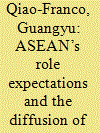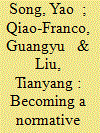| Srl | Item |
| 1 |
ID:
185559


|
|
|
|
|
| Summary/Abstract |
This article examines the diffusion of the principle of ‘common but differentiated responsibilities’ (CBDR) from the United Nations (UN) to the Association of Southeast Asian Nations (ASEAN). Despite its varying interpretations in international negotiations since the 1992 United Nations Framework Convention on Climate Change (UNFCCC), CBDR’s meaning hardly experienced any change in ASEAN. ASEAN’s different interpretation of CBDR from the UN matched the unchanging internal and external role expectations of ASEAN, which were a product of member states’ learning and conditioned by cognitive priors in the region. Cognitive priors in the climate change context included the ‘ASEAN Way’ of collaboration and member states’ deep-seated aspirations for development. The empirical study shows that internally, ASEAN acted as an interactive space for information exchange and a relationship facilitator; externally, it has embraced the position as the voice amplifier for member states in international negotiations. Maintaining the UNFCCC version of CBDR tallied well with ASEAN’s role expectations to: 1) provide member states with room to develop national actions that meet their respective priorities (internal); and 2) put member states in a better position to defend their interests in negotiating adaptation and mitigation responsibilities with extra-regional states (external).
|
|
|
|
|
|
|
|
|
|
|
|
|
|
|
|
| 2 |
ID:
185563


|
|
|
|
|
| Summary/Abstract |
Maintaining robust diplomatic relationships with neighbouring countries in the Mekong region has become strategically critical to China. Since President Xi Jinping took office, China has been renovating normative power in the Mekong region, endeavouring to socialize the Mekong countries into accepting normative Chinese concepts, such as ‘community of shared destiny’, by mobilizing and reconfiguring their material and normative recourses. This article argues that China's normative power stems from two primary mechanisms: 1) an organized, top-down diffusion driven by political elites, involving inter-governmental dialogues, socialization via bilateral and multilateral cooperation mechanisms, and negotiations with countries co-opted into China-led connectivity and infrastructure initiatives; 2) a bottom-up diffusion of ideas from practices (i.e. exchange of goods, trade, aid) and the physical presence of China in the Mekong region, exemplified by the massive scale of infrastructure widely constructed in the region. Taken together, China's expanded normative engagement in the Mekong subregion is comprised of multiple, oscillating modes of normative production that have been ‘synchronized’ across riparian countries with varied geoeconomic and geopolitical circumstances. Our findings suggest that while normative Chinese discourses have been accepted by the ruling classes of certain Mekong countries, China's attempts to build normative power have been largely shunned by the civil societies in the region.
|
|
|
|
|
|
|
|
|
|
|
|
|
|
|
|